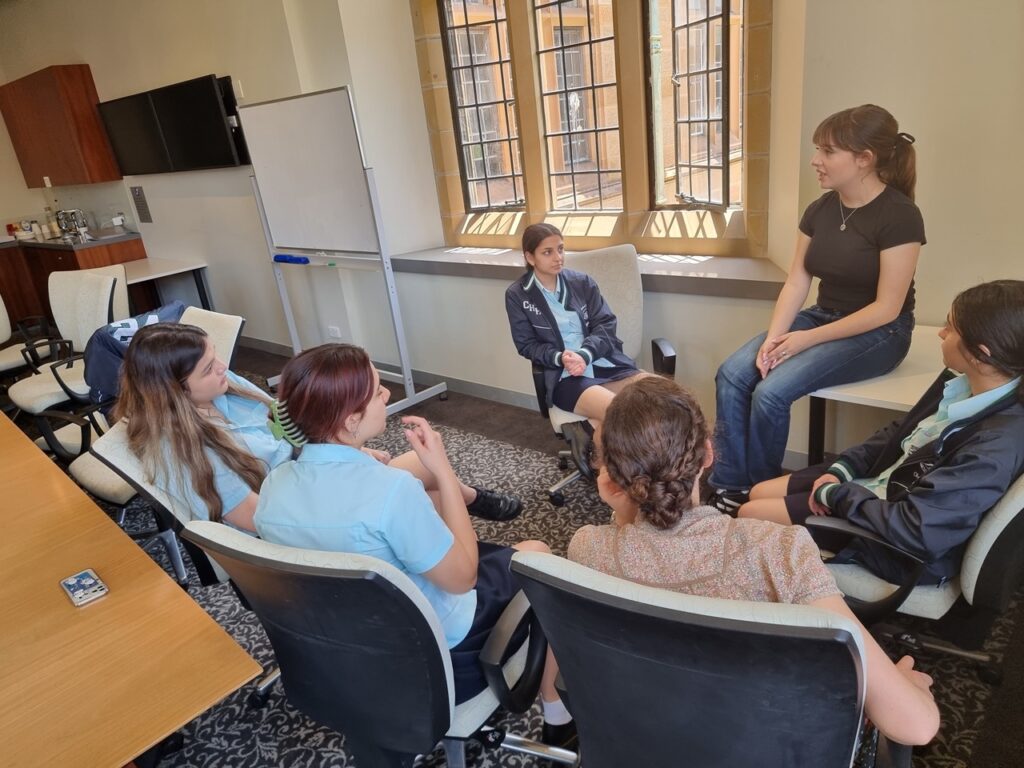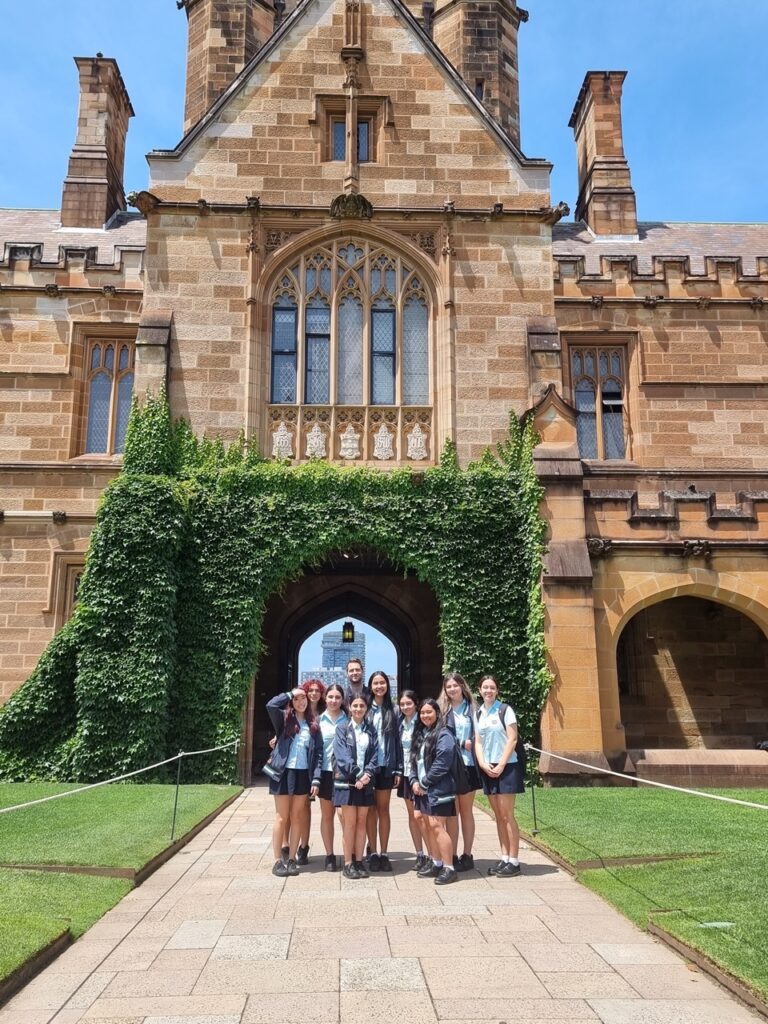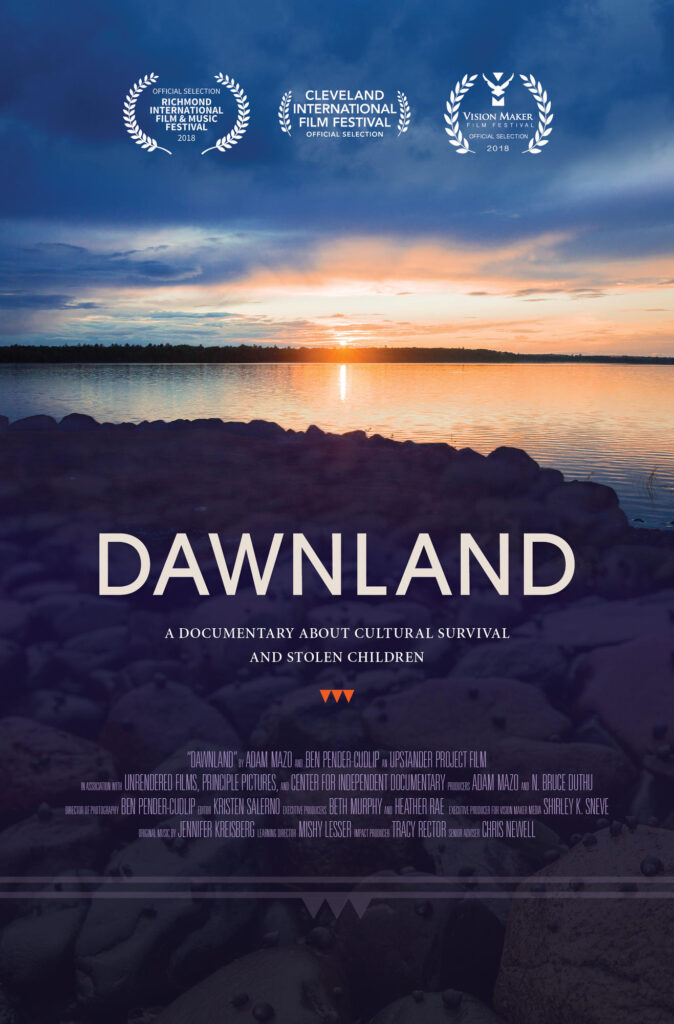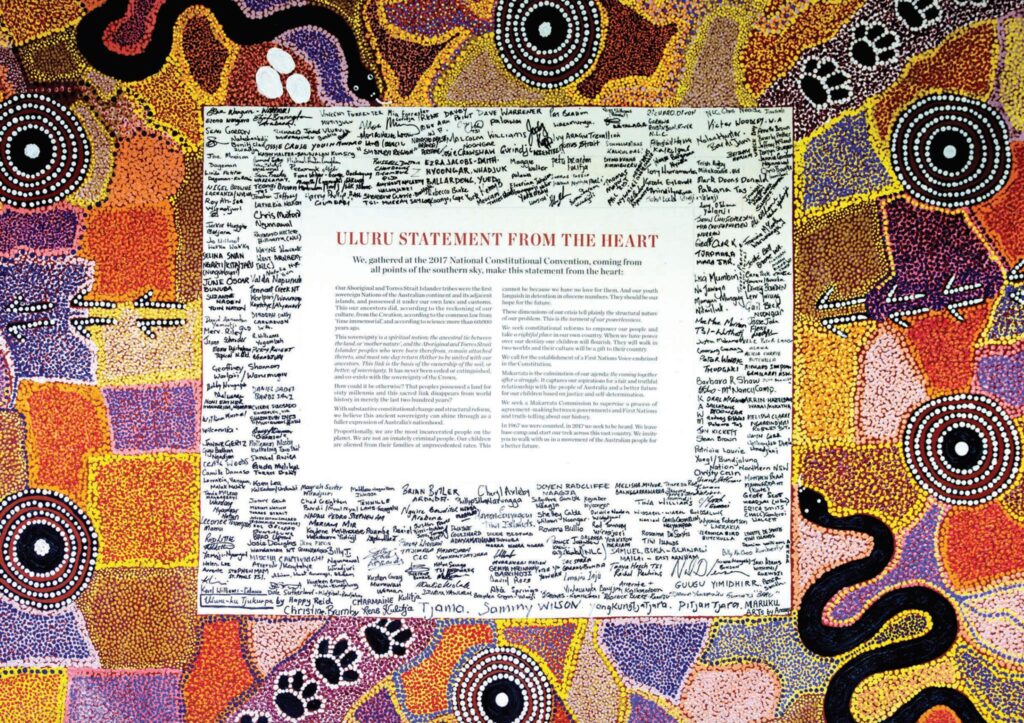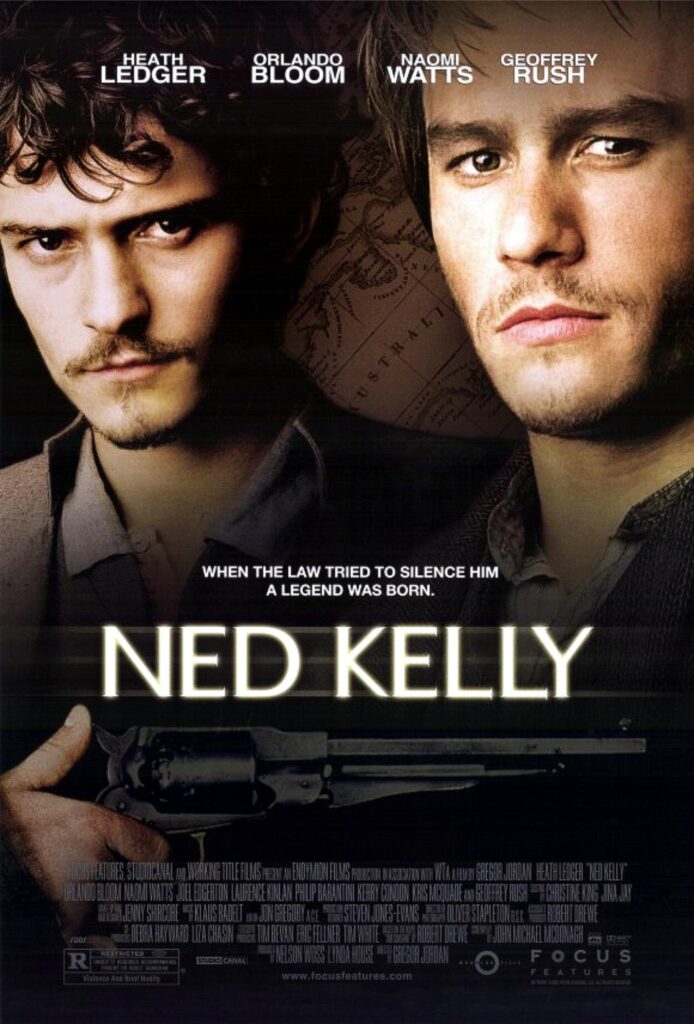Historians in the News – a quick summary
In 2023 our historians have graced TV screens, written in print media, and broadcast the past on radio. Noteworthy are Cindy McCreery, Marco Duranti, and James Curran’s manymedia engagements (local, nation, and international) including James’s work as International Editor at the Financial Review. A special highlight was the ABC’s Natasha Mitchell hosting Chris Hilliard and Niro Kandasamy for the Challis Lecture in History at a packed-out event broadcast on Radio National’s Big Ideas program. 2023 also witnessed the creation of five history podcasts, titled “History of University Life – Whose University? Whose Culture?”, “Monarchy in Peril”, “An Australian World”, “Making Sense of History” and “Speaking of History”. For lovers of art, John Gagné presented in the popular Art Appreciation lecture program at the Art Gallery of NSW. While on campus, History on Wednesday seminars continued to engage audiences from within and outside the university. The discipline’s commitment to outreach continued through the History Extension Mentoring Program. The 2024 program kicked off in November with an enthusiastic uptake from regional high schools. Looking ahead to the new year, two major public events are on the horizon; Professor N. Bruce Duthu (Dartmouth) will be running a public screening of his Emmy award winning documentary ‘Dawnland’ and a public workshop on narrating stories in refugee and Indigenous communities in March, and Professor Chris Clark (Cambridge) will deliver the Ward Lecture in May.
Historians and their Craft
David Brophy: I finished up the editing (all 1000+ pages!) of some WWII diaries I’ve been working on, which have now been published as A Decade in Sino-Soviet Diplomacy: The Diaries of Liu Zerong 1940-49 (Palgrave Macmillan, 2023). I had a journal article accepted as part of a special issue on the concept of the “Persianate” for the Papers of the Modern Language Association and submitted another article to ReOrient: The Journal of Critical Muslim Studies.A couple of book chapters also came out in 2023. One was part of a project with Japanese colleagues on “Historical Narratives and the Utilization of the Past in Central Asia”. The other was a chapter in Ben Kiernan’s Cambridge World History of Genocide, on mass killings during the Qing empire’s expansion into Central Asia. As part of an international group project on “Sects and Sectarianism in Chinese Islam” I was lucky enough to participate in workshops in Tokyo (January) and Riyadh (December), with the group working towards a special issue on this theme in 2024.
Roberto Chauca: I, for the first time, coordinated two units, including my own HSTY2719 and was also part of co-teaching teams in two first-year units, INGS1004 and HSTY1002. An article is forthcoming in Cartographica, journal published by the University of Toronto Press. In November I was invited to lead a seminar at The Amazon Basin as Connecting Borderland symposium organised by the Getty Foundation and colleagues from universities in Brazil, Colombia and Ecuador. I was also accepted to participate in the First Book Workshop in Map History at the Newberry Library in Chicago, USA and in the Fourth World Congress in Environmental History in Oulu, Norway, in February and August 2024, respectively.
Frances Clarke: I spent the first half of the year in the U.S., on long service leave, trying to catch up on a few projects delayed during covid. Our book came out in January (Frances M. Clarke and Rebecca Jo Plant, Of Age: Boy Soldiers and Military Power in Civil War America, New York: Oxford, 2023). We wrote half a dozen blog posts and short pieces to publicize this work and have done seven or eight interviews so far. My collaborator, one of her students, and I also spent several months completing a document project for classroom use, consisting of a dozen letters written by poor women during the Civil War along with an accompanying article: Cayla Regas, Rebecca Jo Plant, and Frances M. Clarke, “‘Do not toss this letter away’: Women’s Hardship Petitions to the U.S. Federal Government during the Civil War,” Women and Social Movements in the United States 1600-2000. (Alexandria, VA: Alexander Street, 2023). I’m also part-way through an ARC discovery project with a number of collaborators, which focuses on the aftermath of war from the Napoleonic era to WWII. We had an article accepted earlier in the year in English Historical Review and we completed several additional chapters of our co-authored book. Coming back to teaching in second semester, I taught a first year American history unit, and a history workshop, as well as running the postgraduate seminar. Now I’m looking forward to starting something new.
James Curran: After spending the first half of the year on long service leave, I commenced a 0.6 position as International editor at the Australian Financial Review (AFR), where I write a weekly column on geopolitics and longer pieces/reviews/ essays for the Weekend AFR. I have also published a long essay in Australian Foreign Affairs on the narrative of the China ‘threat’ and in November was inducted into the Australian Academy of the Social Sciences. I also began a podcast for the discipline and faculty on the history of Australia’s relations with the world (to be released in February and available wherever you get your podcast:) and also signed a book contract with Simon & Schuster for a study of Paul Keating’s foreign policy as PM. During the year I also wrote a number of longer commentaries for Australian Book Review, appeared on the 730 Report and other ABC and local radio nations, and attended and spoke at a conference in Singapore on the Chinese economy. I also spoke at the annual conference of the Australian Institute of International Affairs.
Marco Duranti: Chris Hilliard and I had an article accepted in the Law and History Review on the birching of youth on the Isle of Man. All of us in History collectively won a couple of education awards thanks to Mike McDonnell. I sold out to the mainstream media. My daughter dressed up as a ‘Bluey Monster’ for Halloween and my son succeeded in getting me to watch horror movies with him.
James Findlay: The through-line for this year has been the efforts to finish my first book. A process that could be summarised by the attached drawing my 8-year old son did. I’m happy to say that as of yesterday the last sentence of the last chapter was written. Intro and conclusion still to come, but the submission date looms, and it’s beginning to feel veryreal. Other research work in 2023 included a chapter in an edited collection, Writing Australian History on Screen, and jointly writing an article with a colleague at Deakin University on the controversy generated by the BBC historical television series Banished. I was lucky enough to travel to Paris (sigh) on a successful Partnership Collaboration Award between USYD and the Sorbonne University titled ‘Surveillance Imaginaries’. We also hosted some wonderful French scholars in Sydney in Sept and introduced them to the competitive world of Australian pub trivia. Teaching this year meant coordinating first, second, and third-year Australian history subjects. Extra-curricular activities such as an excursion to Cockatoo Island (thanks Kirsten and Brad!), weekly Australian history film screenings and (very nearly) having students’ work featured in this year’s Vivid festival added further excitement to each semester. I was also thrilled to have my first two honours students Liz Bowmer and Alice Tompson submit their theses. Their work is brilliant and I’m so very proud of their efforts. Guest teaching included lecturing for the Master of Museum and Heritage Studies and delivering a masterclass for postgrad students at the Sorbonne. Ongoing work with colleagues Mike, Niro, and Thomas in the History Extension Mentoring Program has been immensely rewarding. Running History on Wednesday and co-OEI Lead with Niro has also been a real joy (apart from glitchy technology in Lvl 8 conference room). Speaking at the FASS Teaching Symposium and receiving a Commendation for the Faculty of Arts and Social Sciences Teaching Excellence award was a lovely way to round out the year. Writing it all down now is helping me understand why it has all gone so fast.

John Gagné: Together with his co-editors Stephen Bowd and Sarah Cockram, John published a collection of essays titled Shadow Agents of Renaissance War (Amsterdam UP, 2023). He’s also finishing a book, Vibrant Banners, with co-author Timothy McCall for the ‘Elements in the Renaissance’ series (Cambridge UP). He delivered talks (in person and virtual) in Rome, Liège, and Hong Kong. He directed the Medieval and Early Modern Centre and coordinated the History Honours Programme. John co-taught History’s senior capstone class and 2 first-year units. He worked with 8 postgraduate students, and would like to congratulate Kathryn Hempstead for her highly-praised MA thesis (which passed without revision) and Paddy Holt, who submitted his excellent PhD thesis in late September. John was nominated for a SUPRA ‘Supervisor of the Year’ award. He lectured at the Art Gallery of NSW and was interviewed in Honi Soit and on the ABC. Finally, he finished the year with a promotion to Associate Professor.
Chris Hilliard: On SSP in semester 1 I worked out the argument of my next book and wrote the first 20,000 words of it. Marco Duranti and I published an article about corporal punishment and the British constitution (well, that’s how I see it) in Law and History Review. Niro Kandasamy and I spoke at an event organized by the School of Humanities and broadcast on the ABC’s Big Ideas podcast. I continued to co-edit the OUP journal Twentieth Century British History, which is re-launching as Modern British History at the beginning of 2024. I served my first year as a member of the Council of the Australian Academy of the Humanities and became its Treasurer. I stepped in as interim Head of School at the end of October.
Niro Kandasamy: I spent the first semester teaching two units in the International and Global Studies degree. It was gratifying watching students engage with diverse concepts, histories, and case studies, especially as they hone their critical thinking skills to grapple with contemporary questions of sovereignty, justice, and freedom. A trip to London in June provided me invaluable research time at the archives, which culminated in a journal article submitted to History Workshop Journal. I spent the second semester teaching another unit in INGS, and beginning work on some exciting new projects, including co-organising two Workshops that will be held at the Universiti Kebangsaan Malaysia, and the University of Sydney. A highlight of the year has been organising the History on Wednesday seminars with James Findlay – there is so much interesting work happening among fellow researchers! Finally, ongoing work on the History Extension Mentoring program with James, Michael McDonnell, and Thomas Café has been truly rewarding.
Cindy McCreery: 2023 has been another busy year for me both professionally and personally and I took Long Service Leave in Semester 2 to support my family through some big milestones. At work the highlights included extending my engagement with object-based learning in the classroom through my Honours seminar ‘Modern Monarchy and Material Culture in Global Perspective’ and my third-year seminar ‘Eighteenth-century Britain and Ireland’. I was delighted to reflect on this experience during a co-presentation with my former student Emma Slee at the University Museums Annual Conference held at the University’s Chau Chak Wing Museum in August. Another highlight was seeing my four 2022 History Honours students graduate on a beautiful day – lovely to see them reach this milestone – as well as to co-supervise another History Honours student through to successful completion at the end of 2023! It was also a pleasure returning to the Great Hall later in the year to receive a joint Vice-Chancellor’s Excellence award (alongside a Faculty award!) with my History colleagues for Student Experience Excellence. I also enjoyed running co-writing sessions for School of Humanities colleagues on weekdays throughout the year – so nice to bond over coffee and the clicking of our keyboards. With Professor Emeritus Robert Aldrich and Dr. Falko Schnicke I co-edited Global Royal Families (Oxford University Press 2024). Robert and I also recorded a six- episode podcast series ‘Monarchy in Peril’ produced by the School of Humanities’ Peter Adams – listen out for it in the new year. Our Modern Monarchy in Global Perspective Research Hub continues to thrive with over fifty members from across the globe. This year we hosted regular formal seminar papers via ZOOM as well as several special roundtable discussions on ‘Succession in Modern Monarchy’ and ‘The Coronation in Modern Monarchy’. I also continued my media work and in addition to interviews, participated in two television documentaries, one for French national TV on 19c. French explorers in Australia and one for Swedish national TV on 20c. British and Scandinavian monarchies. On the home front I shepherded my three children through Years 12, 10 and 7 respectively and survived the HSC, NAPLAN, AMEB and NSW driving exams. In 2024 I am looking forward to another busy and productive year – but with fewer acronyms.:)
Michael McDonnell: It has been a busy but rewarding year after taking on the role of Chair of History in January. Much of my energy has been spent learning the ropes, understanding how the University works, and figuring out how we might be able to make it work better. The best part of the job, however, has been learning much more about the varied and diverse work of my terrific colleagues in History, and getting to know more and more students through the various events and talks at which we’ve come together – as well as recent graduates. In between a fairly demanding schedule of meetings and events, I’ve managed to make some progress on a couple of research projects, including a three-part podcast series on Indigenous portraiture and empire with colleague Kate Fullagar, and a co-edited three-volume Cambridge History of the American Revolution, both of which should be out next year. I did not make as much progress on the monograph on Revolutionary War Memoirs as I would have liked, in part because I have been getting too interested in new research projects with colleagues in the School and beyond – on refugee history, and on working with community organisations to support their history-making. I’ve also been working closely with one of our amazing former students, Darcy Campbell, to write some scholarly articles about the unit History Beyond the Classroom, andwas very happy to be involved in the successful nomination of colleagues in History for a Faculty Student Success Award, and a Vice Chancellor’s award for Supporting the Student Experience. Finally, and as always, I’ve enjoyed being involved in the Social Inclusion program which this year has focused on supporting History Extension high school students in diverse, low-ses and regional/rural schools. It is a pleasure to work alongside colleagues Thomas Café, Niro Kandasamy, and James Findlay and our great volunteer student mentors to support the many wonderful teachers and students who are part of the program.
Kirsten McKenzie – First semester was an intense teaching experience with a new Honours seminar and teaming up with John Gagné for our new core third year unit, HSTY3903 History and Historians. That was a wild ride with timetabling and other challenges including the last gasp of RE/CC teaching. There were times when I didn’t think we could make it work, but watching such a large cohort of students come up with outstanding projects and reading the wonderfully warm responses we got in student evaluations made it all worthwhile. Second semester saw five months overseas on sabbatical leave – a very welcome opportunity to get stuck into archives again, mostly in Scotland. Reading through an extraordinary collection of family documents from the late eighteenth and early nineteenth century letter by letter was like being plunged into an undigested version of War and Peace or Vanity Fair as viewed through the lens of Edward Said. With photography forbidden I came away with more than 300 000 words of transcription. Now I face the challenge of securing permission to use the material. Debate over the legacy of empire in Britain has made these questions more than usually politically fraught. Never one to accumulate annual leave, I also managed to fit in some close encounters with lions and elephants on safari, reconnected with in-laws in the mountains of Sicily and scrubbed up in a public bath built in 1556. As the year draws to the close I’m in the last stages of two books that will come out with Cambridge University Press next year – copyediting one and preparing another for final submission. I’m looking forward to new challenges next year when I take over as Director of the Vere Gordon Childe Centre for the study of humanity through time.
Jess Melvin: Together with my co-editors Annie Pohlman and Sri Lestari Wahyuningroem, I am very pleased that our new book Resisting Indonesia’s Culture of Impunity: Aceh’s Truth and Reconciliation Commission has been published by ANU Press. This book examines the role of Indonesia’s first truth and reconciliation commission- The Aceh Truth and Reconciliation Commission, or KKR Aceh- in investigating and redressing the extensive human rights violations committed during three decades of brutal separatist conflict (1976-2005) in the province of Aceh. Most excitingly, each chapter has been written by a team of authors, composed predominantly of commissioners and staff from the KKR itself, members of key civil society organisations in Aceh and Jakarta and academics. In other news, my family and I were adopted by a new kitten, Hunter. His favourite activity is annoying our two other cats. He also likes to eat durian.
Andres Rodriguez: Andres has enjoyed being on Long Service Leave after working for ten years at USYD. He also has enjoyed explaining to his non-Aussie friends what this actually means. He became an Aussie citizen along with his family, but still not quite appreciating the joys of eating Vegemite. Earlier this year Andres hit the archives at the National Library of Australia working with its Chinese language materials as part of his new Burma Road project. He then travelled to London and worked at the British Library – and left the day the library system came under a ransomware attack. He is also feeling more ‘senior’ this year.
Hélène Sirantoine: How to sum up another busy year?!? I guess for me 2023 has been most of all a constant ‘lost in translation’ experience. Among other things, I’ve finally published a book chapter (‘When being king was not enough: imperatores in medieval Iberia’, freely available here) that quickly summarises for an English audience the contents of my 2012 French-language monograph on medieval imperial Spanish experiments (Imperator Hispaniae: Les idéologies impériales dans le royaume de León, Casa de Velázquez). I’ve got an article accepted in the French journal Cahiers de civilisation médiévale, that explores the Latin narration of the eighth-century Islamic conquest of Spain by the twelfth-century English cleric Ralph the Black. All the while I’ve been trying to remember my Spanish grammar, co-drafting with a Catalan colleague a Latin edition, translation into Castilian, and Spanish commentary of the chronicle composed by Genoese consul Caffaro di Rustico about the conquest of Andalusí coastal towns of Almería and Tortosa in 1147-1148 by an alliance of Castilian, Genoese and Catalan terrestrial and naval forces. Needless to say, ya no sé ahora dans quel monde (et langue!) je vis…


